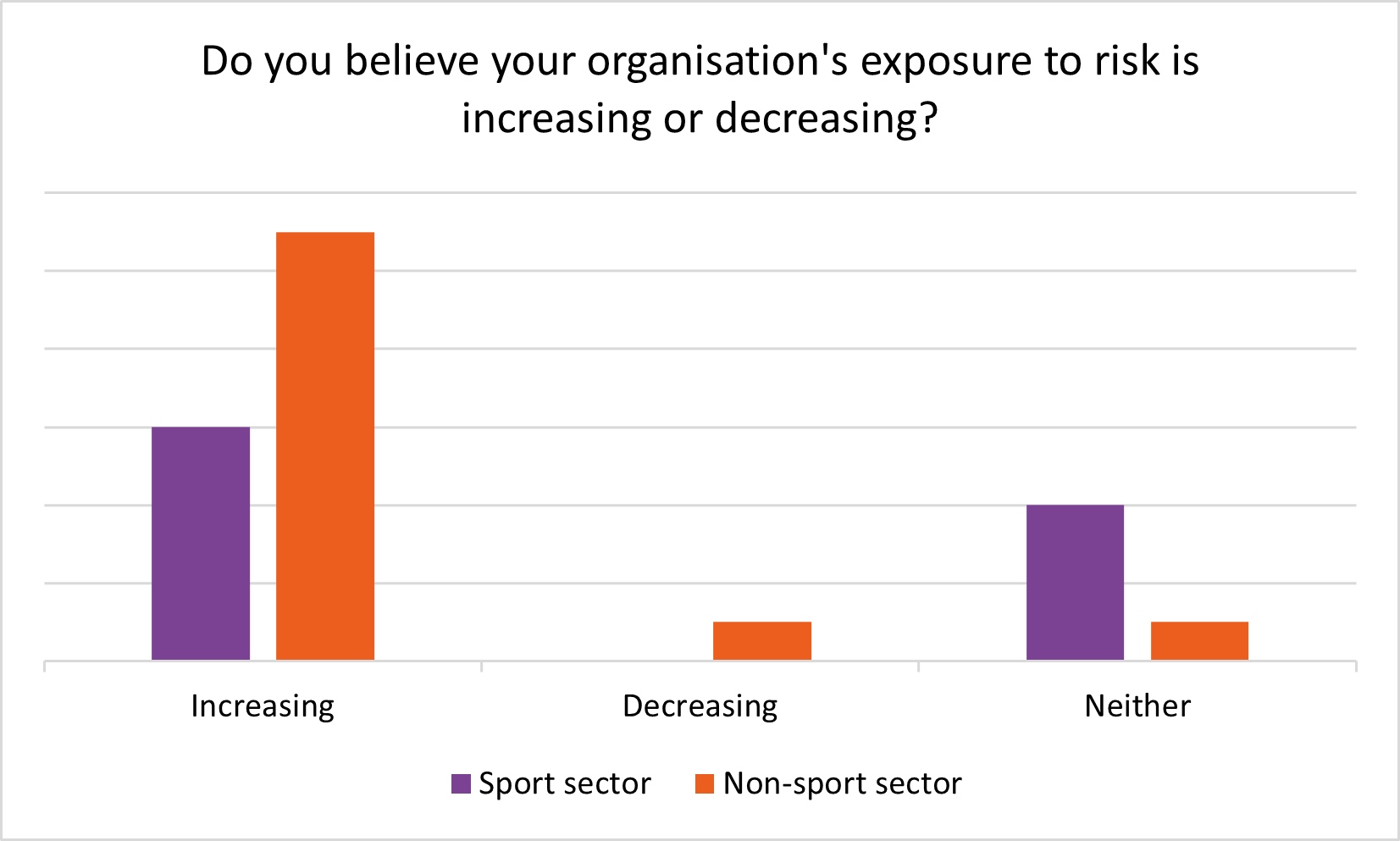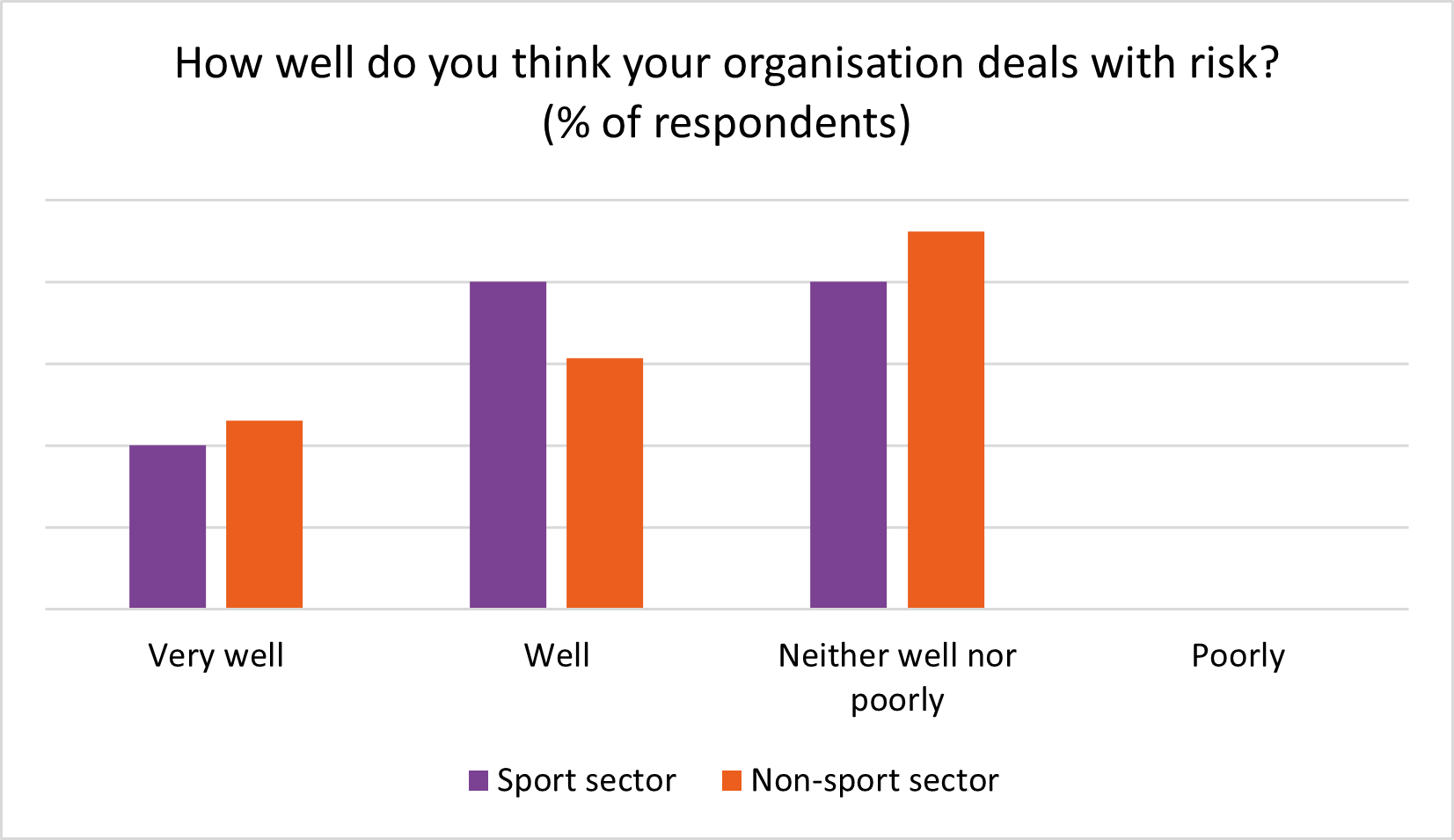
Results from the CGIUKI social media survey on risk
Some findings from the recent survey carried out by The Chartered Governance Institute UK & Ireland, covering both the sport and non-sport sector.
Date: 23rd Aug 2022
Author: Craig Beeston, The Chartered Governance Institute UK & Ireland
The Chartered Governance Institute UK & Ireland recently conducted a cross sectoral survey on social media of organisations’ experience of risk and risk management. The aim was to ascertain how well organisations feel they are addressing the issue of risk, how comfortable respondents are that they have in place effective risk management and mitigation processes, and to gain a snapshot of the key types of risk that organisations feel they currently face.
Interestingly, the results show that 60% of respondents in the sports sector felt that their organisation’s exposure to risk was increasing, compared with 84.6% in the non-sport sector.

Three fifths of sports organisations feel that they deal with risk either well or very well, slightly ahead of other sectors, with the remaining two fifths of respondents holding a neutral view as to how well their organisation handles risk.

Respondents who felt that their organisation managed risk well described regular monitoring and reporting across three levels of risk – strategic, operational and organisational – with frequently updated identification of ‘top risks’, regular review of the risk register and mitigation actions, and the board’s engagement with risk management processes.
Where some respondents felt that the maturity of their risk management framework could be improved, factors cited for this position included lack of resource, the need to embed risk considerations throughout the organisation’s working practices, lower confidence and less robust process around non-financial risk categories, and insufficient understanding at board level of difference between sport-technical risk and other types of risk facing the organisation.
In the main, the experiences in the sport sector echoed those described by respondents in other sectors. Some spoke of boards that were fully engaged in risk. Others, meanwhile, detailed a struggle to establish consistent practices across siloed operations and the absence of an effective risk culture across their organisation. Across all respondents, by far the more popular suggestions for improved risk management related to the implementation of better processes (23%) and training and guidance for staff and board members (33%).
One warning sounded will be familiar to a number of organisations: a system that seems robust on the surface, where risks are well identified and controls appear to be well-designed, but where little is actually done with what is noted and where insufficient (or no) subsequent analysis takes place. Those first steps are of course crucial, but to be effective, risk management must be a live process, adapting to circumstances and lived throughout the organisation.
Bodies in the sport sector were asked to identify sport-specific risks to which they felt susceptible. Over a third cited concerned financial risks covering the related issues of a lack of income diversity (21.7%) and a reliance on public funding (16.2%). It is encouraging to see that there is a recognition of these risks, especially given the financial support provided to the sector in response to Covid-19 when other income streams were severely curtailed.
| What are the main types of sport-specific risk to which you feel your organisation is susceptible? | % of options cited by respondents |
|---|---|
| Integrity issues | 2.7 |
| Environmental issues that may affect sporting events | 13.5 |
| Lack of income diversity | 21.7 |
| Participation numbers | 10.8 |
| Pandemics | 13.5 |
| Perception of fairness | 2.7 |
| Reliance on public funding | 16.2 |
| Safeguarding, safety and welfare | 18.9 |
It is of course no surprise to see considerations such as pandemics loom large in organisations’ risk considerations. While the likelihood of a pandemic striking is unchanged statistically, the past two years of unparalleled disruption have brought home emphatically the impact on business, revenue and activity that one can cause. It is perhaps for this reason of conversational context – seen for example in crime attitude surveys, where a sense of vulnerability occasioned by a recent nearby incident can prompt a heightened sense of a problem's prevalence not necessarily borne out by the data – that the recurrence of a pandemic accounted for almost 15% of suggested sport-specific risks. Though the probability of another pandemic on that scale in the immediate future is low, an increased focus on business continuity and crisis management planning will no doubt place organisations on a sounder footing with regards to non-pandemic related dislocations.
The same number identified environmental issues with the potential to affect sporting events, perhaps reflecting a general uptick in awareness of and sensitivity to climate change as well as a growing appreciation of the operational and business impact of both gradual change and extreme weather events on organisations charged with hosting competitions and with the wellbeing of participants and spectators.
Safeguarding, welfare and safety accounted for almost a fifth (18.9%) of the risk issues suggested and were noted by 70% of respondents. In a sporting context, this category is of course a serious operational risk and one which should feature prominently in organisations’ considerations. Again, however, the efficacy of any attempts to mitigate will be heavily dependent on the degree to which it is embedded into the culture of the organisation at all levels. It is no good if it is simply an entry in a risk register. Like all risks, it must be a constant part of thinking and vigilance.
The Institute’s poll offers just a quick insight into organisations’ thinking on risk. While we should avoid reading too much into the results of a small scale survey, it is nevertheless interesting to reflect on where attitudes seem to be at the moment. There is a generally positive focus on risk, but also an awareness of where shortcomings lie. With effective training, guidance and a cultural commitment to applying the correct thinking and processes at all levels, we would hope to see the landscape improve further, with more organisations thinking critically about the risks they face and incorporating risk considerations even more fully into decision making and business planning.
For more information on risk, visit the SGA's knowledge base. We will be issuing more content on risk and risk management later in the year.
Craig Beeston is the SGA Programme Manager at The Chartered Governance Institute UK & Ireland
